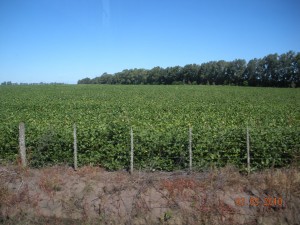
Argentine Countryside
This morning we boarded the bus for a 3-hour trip to the David Hughes farm to meet with farm management and local agronomic professionals. As we gradually passed out of the city into the Argentine countryside, I immediately had a comfortable sense of home, because of the similarities between this region of the pampas and portions of central Illinois. Flat topography, fertile soils with relatively high organic matter, similar crop rotations, and obviously high management.
Argentina has a noticeably more mature state of development than what we observed in Mato Grosso, and yet they have also have a profound respect for the traditions of the past. Primary roads to the countryside were in far greater condition than Brazil, but side roads were largely unpaved. Most grain commodities here are still moved by truck, although the distances are more manageable. Farmstead design could be described as hacienda-style, with gated entrances and long driveways lined with trees, leading to a farmstead that is functional by design and softened to the point of being nearly hidden by natural-style landscaping.
The population here seems to be less diverse than Brazil and is obviously influenced by European-Spanish ancestry. The people are warm and friendly with an unrushed pace, as was evidenced by the warm greeting and hospitality we received from our hosts at the farm. Many of those working in management in agriculture have advanced degrees, and most of those were trained in universities in the Midwestern US.
The David Hughes farm works under a different business model than seen in US cropping enterprises. The operation is divided into a land-holding entity and an operational entity. The farm consists of 35,000 acres, 2/3 of which is in row crop. About 90% of the farm land is owned and the balance rented. The operation owns very little equipment and all field operations, from planting to harvesting, is done by a custom machinery business that works

Our Host Francisco (Poncho) Abello
under contract with the farm. This arrangement allows the farm to focus on hiring individuals trained in agronomics and business management. A Management Information System (MIS) ties crop records directly to the accounting system for a very accurate and current picture of cost of production and profitability.
We boarded pickup trucks and wagons for an up close tour of the farming operation, which conflicted a bit with our business casual dress. The roughest part of the trip for many were the swarming and biting mosquitoes. Everyone was happy to suffer the dust, bumps, and bites for this firsthand experience on the farm.
All crops are grown under no-till methods, facilitated by relatively deep, well-drained soils of volcanic origin. Crop rotation is corn followed by soybeans followed by wheat then double-crop soybeans. Long growing seasons even accommodate double crop corn behind wheat. Nearly all soybeans are roundup-ready, but Argentine laws have made tech fees difficult to manage for Monsanto and nearly all farmers save seed without paying the tech fee.
Precision agriculture has started to take a foothold. One of our guests Susana Grigera, PhD in agronomy from University of Nebraska, told of starting a precision agriculture business upon her return to the country. An unexpected increase in export taxes by the federal government forced agriculture into a position of tightening the belt on technology investments. This pressure along with the global economic crisis eventually forced her to close. Technology is general is lagging somewhat because of these lingering governmental effects. For example, VT3 triple stack technology in corn has not yet been released here in Argentina.
The operation has also recently started developing 60,000 acres of pasture land further west in Argentina on marginal land closer to the mountains. This move is reflective of a general trend that has seen cattle gradually being displaced by row crop on high productivity soils in the pampas region, not unlike what we have seen in the mid-western US.
We concluded the day’s events with a traditional Argentine barbeque were meat is placed over low flat cooking racks about a foot above the ground. The meat is gradually roasted by charcoals from a separate wood fire which are moved by shovel and positoned underneath the cooking rack. The net result is a low, slow cooked, wood-fired meat that was absolutely superb. We had a cut of beef T-bone, pork loin, and chorizo pork sausage. We said farewell to our guests and returned to the city for our final night in Argentina.


Leave a Reply
You must be logged in to post a comment.